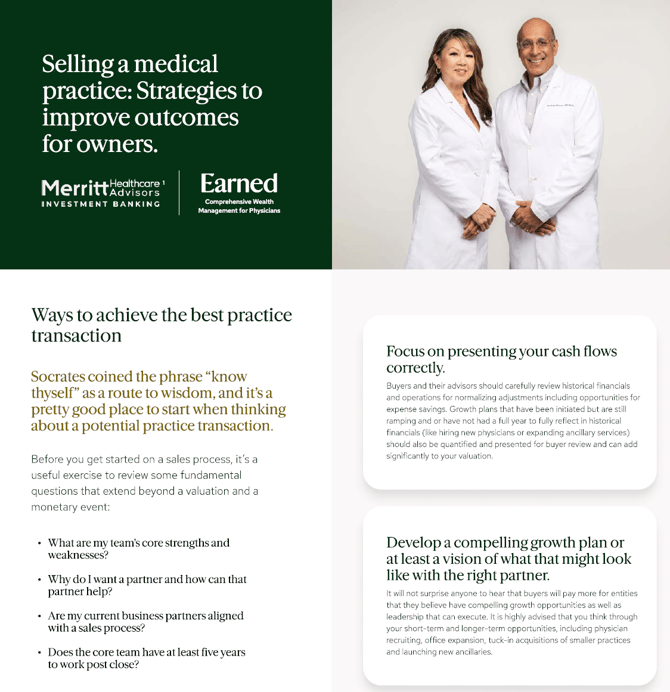Selling Medical Your Medical Practice: Strategies To Improve Outcomes
1 Minute Read
Selling Medical Your Medical Practice: Strategies To Improve Outcomes
3:23
Selling Medical Your Medical Practice: Strategies To Improve Outcomes
This article from Merritt Hawkins outlines the comprehensive process of acquiring medical practices, emphasizing the necessity of strategic planning, thorough financial due diligence, and regulatory compliance. Key steps include initial assessment, detailed valuation, negotiation, and finalization, with a focus on aligning acquisition goals and ensuring smooth transitions. Best practices such as engaging professional advisors, understanding legal obligations, and evaluating financial health are highlighted to mitigate risks and enhance success. Additionally, the document includes case studies of successful acquisitions and lessons learned, providing valuable insights for prospective buyers.

This article from Merrit Hawkins provides insights into the process of acquiring medical practices, emphasizing the importance of strategic planning, due diligence, and professional advice.
Key Considerations:
-
Financial Due Diligence:
- Assess financial health and stability.
- Review revenue streams, expenses, and profitability.
- Evaluate existing contracts and liabilities.
-
Regulatory Compliance:
- Ensure compliance with healthcare regulations.
- Check for any legal issues or pending litigations.
- Review licensing and accreditation statuses.
-
Market Analysis:
- Analyze the local healthcare market.
- Understand patient demographics and competition.
- Evaluate the practice's reputation and patient base.
Process Steps:
-
Initial Assessment:
- Conduct a preliminary review of the practice.
- Identify potential opportunities and risks.
- Determine alignment with acquisition goals.
-
Valuation:
- Perform a detailed valuation of the practice.
- Consider both tangible and intangible assets.
- Use multiple valuation methods for accuracy.
-
Negotiation:
- Negotiate terms and conditions of the acquisition.
- Address key aspects such as purchase price, payment terms, and transition plans.
- Ensure both parties agree on post-acquisition roles.
-
Finalization:
- Complete legal documentation and contracts.
- Plan and execute the transition process.
- Communicate changes to staff and patients.
Best Practices:
-
Engage Professional Advisors:
- Seek advice from financial, legal, and healthcare consultants.
- Utilize their expertise to navigate complex issues.
-
Understand Legal Obligations:
- Be aware of all legal responsibilities post-acquisition.
- Ensure clear understanding of employment laws and patient care regulations.
-
Evaluate Financial Health:
- Continuously monitor financial performance.
- Implement strategies for growth and improvement.
Case Studies:
-
Successful Practice Acquisitions:
- Examples of effective acquisitions and their outcomes.
- Highlight key factors contributing to success.
-
Lessons Learned:
- Identify common challenges and pitfalls.
- Share insights on overcoming obstacles.
Conclusion:
-
Recap of Key Points:
- Importance of thorough due diligence, strategic planning, and professional guidance.
-
Final Thoughts:
- Emphasize the benefits of a well-executed practice acquisition.
- Encourage continuous evaluation and adaptation for sustained success.
The document provides a comprehensive guide to acquiring medical practices, highlighting essential steps, best practices, and the importance of expert advice to ensure successful outcomes.

